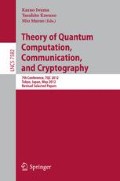Abstract
It is known that the security evaluation can be done by smoothing of Rényi entropy of order 2 in the quantum setting when we apply universal2 hash functions. This fact can be extended to the case when we apply ε-almost dual universal2 hash functions, which is a generalized concept of universal2 hash functions. Demonstrating the smoothing of Rényi entropy of order 2, we derived security bounds for universal composability and mutual information criterion under the condition in the quantum setting.
Access this chapter
Tax calculation will be finalised at checkout
Purchases are for personal use only
Preview
Unable to display preview. Download preview PDF.
References
Carter, J.L., Wegman, M.N.: Universal Classes of Hash Functions. J. Comput. System Sci. 18, 143–154 (1979)
Wegman, M.N., Carter, J.L.: New Hash Functions and Their Use in Authentication and Set Inequality. J. Comput. System Sci. 22, 265–279 (1981)
Mansour, Y., Nisan, N., Tiwari, P.: The Computational Complexity of Universal Hashing. In: STOC 1990, Proceedings of the Twenty-second Annual ACM Symposium on Theory of Computing, pp. 235–243 (1990)
Bennett, C.H., Brassard, G., Crepeau, C., Maurer, U.M.: Generalized privacy amplification. IEEE Transactions on Information Theory 41, 1915–1923 (1995)
Golub, G.H., Van Loan, C.F.: Matrix Computation, 3rd edn. The John Hopkins University Press (1996)
Renner, R.: Security of Quantum Key Distribution. PhD thesis, Dipl. Phys. ETH, Switzerland, 2005; arXiv:quantph/0512258 (2005)
Dodis, Y., Smith, A.: Correcting Errors Without Leaking Partial Information. In: STOC 2005, pp. 654–663 (2005)
Fehr, S., Schaffner, C.: Randomness Extraction Via δ-Biased Masking in the Presence of a Quantum Attacker. In: Canetti, R. (ed.) TCC 2008. LNCS, vol. 4948, pp. 465–481. Springer, Heidelberg (2008)
Hayashi, M.: Quantum Information: An Introduction. Springer (2006)
Hayashi, M.: Upper bounds of eavesdropper’s performances in finite-length code with the decoy method. Physical Review A 76, 012329 (2007); Physical Review A 79, 019901(E) (2009)
Hayashi, M.: Tight exponential evaluation for universal composablity with privacy amplification and its applications. arXiv:1010.1358 (2010)
Hayashi, M.: Exponential decreasing rate of leaked information in universal random privacy amplification. IEEE Transactions on Information Theory 57(6), 3989–4001 (2011)
Tsurumaru, T., Hayashi, M.: Dual universality of hash functions and its applications to quantum cryptography. arXiv:1101.0064 (2011)
Håstad, J., Impagliazzo, R., Levin, L.A., Luby, M.: A Pseudorandom Generator from any One-way Function. SIAM J. Comput. 28, 1364 (1999)
Devetak, I., Winter, A.: Distillation of secret key and entanglement from quantum states. Proc. R. Soc. Lond. A, 461, 207–235 (2005)
Hayashi, M.: Classical and quantum security analysis via smoothing of Renyi entropy of order 2. arXiv:1202.0322 (2012)
Author information
Authors and Affiliations
Editor information
Editors and Affiliations
Rights and permissions
Copyright information
© 2013 Springer-Verlag Berlin Heidelberg
About this paper
Cite this paper
Hayashi, M. (2013). Quantum Security Analysis via Smoothing of Renyi Entropy of Order 2. In: Iwama, K., Kawano, Y., Murao, M. (eds) Theory of Quantum Computation, Communication, and Cryptography. TQC 2012. Lecture Notes in Computer Science, vol 7582. Springer, Berlin, Heidelberg. https://doi.org/10.1007/978-3-642-35656-8_11
Download citation
DOI: https://doi.org/10.1007/978-3-642-35656-8_11
Publisher Name: Springer, Berlin, Heidelberg
Print ISBN: 978-3-642-35655-1
Online ISBN: 978-3-642-35656-8
eBook Packages: Computer ScienceComputer Science (R0)

